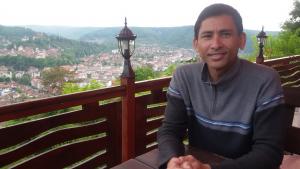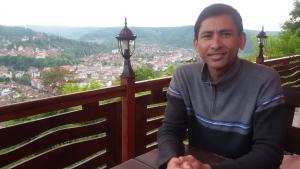Article Information
- ARTICLE_POSTED_BY: Haiti Place Staff
- ARTICLE_POSTED_ON: May 28, 2015
- Comments : 1
- Views : 1092
- Category : Other
- Description : <strong>Does the Diaspora have a strong impact in Haiti? And if so, do you think people in Haiti recognize the power of the Diaspora?</strong>
Overview
 Marcel Wah
Marcel WahDoes the Diaspora have a strong impact in Haiti? And if so, do you think people in Haiti recognize the power of the Diaspora?
I don't think the Diaspora has any power right now. At least they haven't proven it.
If they did have power, we would see more influence exercised by the Diaspora in terms of policies, in terms of elections, in terms of economics, in terms of business. Every area would be impacted if there was a real Diaspora influence. The Diaspora would have been included in the decision-making process on important issues. But they are not.
I believe that people in Haiti just see the Diaspora as a group that is there, and that can potentially have a lot of influence if they were better organized. I do think, however, that they do understand the power the Diaspora has in terms of remittances. And it's significant enough to have an impact if the Diaspora were to use it as a political leverage.
But even with that, we haven't really used it to our benefit.
Some people may argue that the Diaspora has been having an impact or an influence in Haiti because you can see so many members of the Diaspora having small projects over there, small businesses, some of them may be consultants, or they are involved with the big non-profits. Don't you think this is not power?
No. I think people have found ways to still do the things that they are passionate and care about, in a small way. While it's good, and it certainly has benefited the small group of people that they are working with, but this is not what Haiti needs.
Haiti doesn't need a lot of small projects that make one person or a small group of people in the Diaspora feel good about. What Haiti needs is the will of everyone to come together for a common cause, a common vision, so that together the country moves forward and everybody knows where they are moving towards to.
The problems are too great for us to be focusing on small things. Small things don't really have any long term or lasting impact, because a lot of these small projects are underfunded and lack the right resources. And while they are good for the short term, how long will they last?
Everyone is aware of those big problems, but no one wants to tackle this and say: "OK, we are going to solve this problem in the next 5 years, in the next 10 years, etc." I don’t even believe that we think in this way, where we can commit to a plan that is 10, 15, even 50 years into the future. We seem to think, as other developing countries do, in months to up to one year. That is not planning, and there is no way to have long-term impact.
Do you think the Diaspora is well connected? They seem to organize many events where they meet, and have various mailing lists that they use to communicate.
We are connected in small ways, in small communities. Again, the thinking is too small. Not big enough. That's where the root problem comes in. We are thinking about just doing very small things; I call them the “feel-good events.”
Because it feels good to know that we are doing something, that we are having conversations, but what is missing are the actions. There is no follow-through to the things that people talk about, and the things that they know very well need to change.
So, it's not a concerted effort that calls upon all the organizations (businesses and non-profits), influencers and policy makers, for example, to sit down and say: "Let's break it down, and let us identify what our resources are, what are the things that we can actually do together, and so on."
First of all, they work only among themselves. Only among the Diaspora. But the Diaspora is not just Haitians in the US, the Diaspora is not just Haitians in Canada, or France, or wherever they may be. The Diaspora is wherever they are around the world.
Since we launched the 11th Department, we are learning that there are all these incredible communities all over, from France to the UK, from Australia to Mexico, Canada to the US, and even in the Caribbean. But all of those communities are not connected.
They are disconnected groups, and you cannot have a movement, or have any kind of large impact, if you are operating in such a small scale with no clear leadership and vision.
So, with these events, yes they are important to keep people connected on some level, but we need something much larger in scale, we need to THINK BIGGER!
One key obstacle is that Haitians cannot seem to work together as teams, as groups, which is why we do things on such a small scale. This is not an issue that is strictly Haitian by the way. This is a developing country issue, where the mentality, the history, unfortunately, and even the culture, inhibits togetherness and forward movement. We need to get to the point where people can say: "We are going to put our differences and feelings aside, and we are going to focus on what is good for the country. Let's figure out a way to do this."
How can the 11th Department help unite the Haitian communities? It is a great communication tool, but it does not replace leadership. There has to be a leadership component to achieve real results.
The leadership component is the next thing. Right now the 11th Department is connecting people and bringing them together to identify who they are, where they are, and grouping them based on their expertise and their field of knowledge so we can start the conversation about Haiti, to open the dialogue, and to invite those from Haiti as well.
Secondly, we need to have a framework that the Diaspora is going to work in. And that framework has to be an organization that is structured in a way that groups people, for example, not just by geography, but also by their areas of expertise, and involving key partners in this organization. The key partners are the international institutions, they are the Friends of Haiti, the Haitian government. All of the stakeholders need to be present. It has to be an inclusive organization, which must, and I stress must, involve those in Haiti as well.
We then have to identify a clear leader. A clear leader that is elected, that is very dynamic, that knows how to lead, and is respected. Leadership carries with it a great responsibility. It's not something that you want to do because you want to lead. Being a leader means knowing your strengths as well as your weaknesses, and being someone that people will want to follow.
We have to have regular elections, like you do with anything else, where people can present their candidacy. Each major community can identify someone who they already know. For example, if you are in the Haitian community in Boston, you know who the leaders are already. You would identify the best person who can do the job. Then you may have a leader that best serves the Boston community, you may have one that best serves the Florida one, same with New York, etc. This is the kind of structure that needs to be put in place.
We have to think big and get really organized in order to help overcome the huge issues that Haiti is facing right now.
This kind of movement should be supported by the Haitian government, as well.
Yes, MAHVE (The Ministry of Haitians Living Abroad) in particular.
The Haitian government has to be more vocal about what the Diaspora does in its own right, and communicate to the Haitian people to let them know that we are their friends. Because many times we see each other as enemies, in some ways. Some may talk badly about the Haitian people in Haiti, saying for example, that they don't know what they are doing and the like. And the people in Haiti too talk badly about us, the Diaspora, by saying for example, that we behave as if we know it all.
We have to stop these kinds of attacks. Instead, we should look at each other as the only true ally we have. There's no other way to look at it. We need each other, and no group can do it without the other.
If the Haitian Diaspora think they can do it all alone, and know it all, they are delusional. If the Haitian people in Haiti also think that they can do it all alone, and know it all, they too are delusional. Because we each have something to give to one another, and MAHVE is the bridge that can connect the two. We haven’t had that kind of leadership, except a potential one from former Minister Guillaume. Unfortunately, his term was cut short and it’s a great loss for Haiti and the Haitian people.
MAHVE can really connect the two together (Haiti and the Diaspora), and the 11th Department exists for them to be able to do that. It's very simple.
